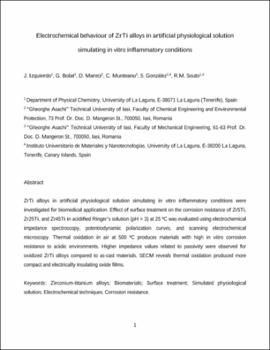Electrochemical behaviour of ZrTi alloys in artificial physiological solution simulating in vitro inflammatory conditions
Fecha
2014Resumen
ZrTi alloys in artificial physiological solution simulating in vitro inflammatory conditions were investigated for biomedical application. Effect of surface treatment on the corrosion resistance of Zr5Ti, Zr25Ti, and Zr45Ti in acidified Ringer’s solution (pH = 3) at 25 ºC was evaluated using electrochemical impedance spectroscopy, potentiodynamic polarization curves, and scanning electrochemical microscopy. Thermal oxidation in air at 500 ºC produces materials with high in vitro corrosion resistance to acidic environments. Higher impedance values related to passivity were observed for oxidized ZrTi alloys compared to as-cast materials. SECM reveals thermal oxidation produced more compact and electrically insulating oxide films Zirconium-titanium alloys Biomaterials Surface treatment Simulated physiological solution Electrochemical techniques Corrosion resistance






